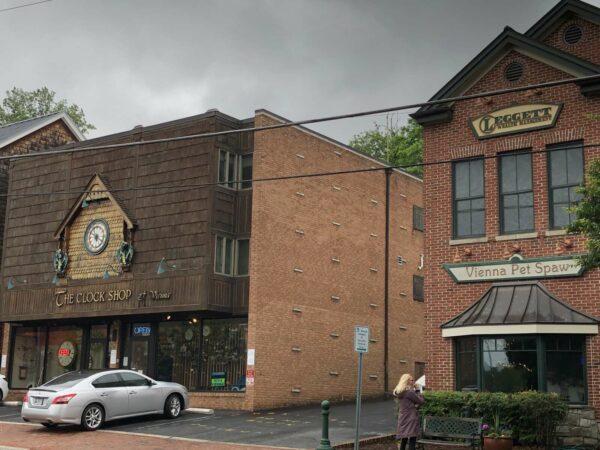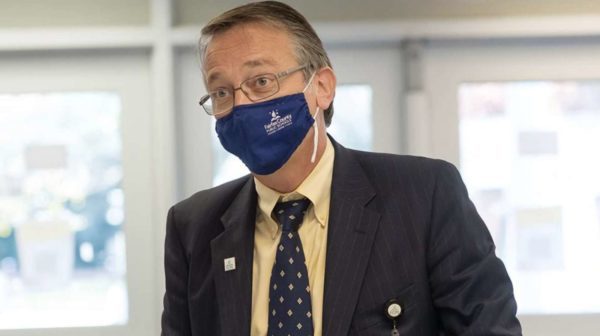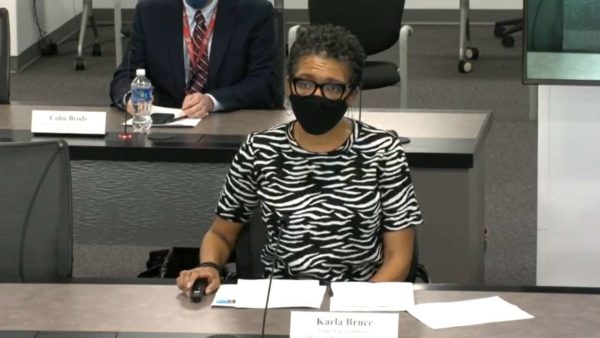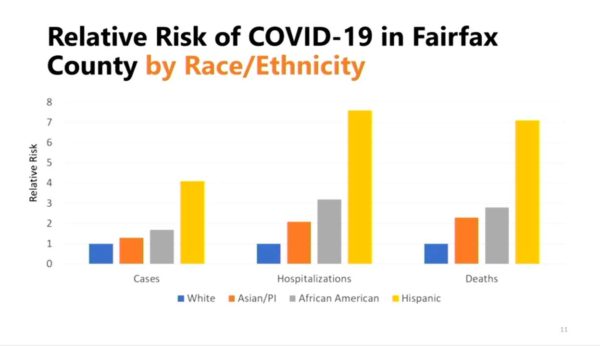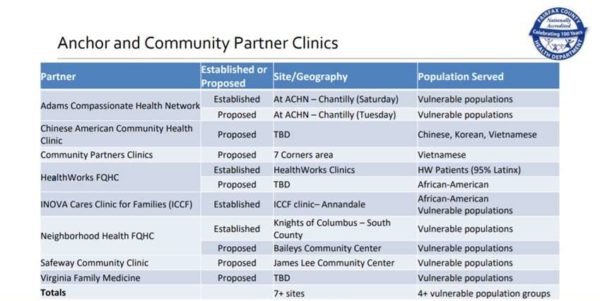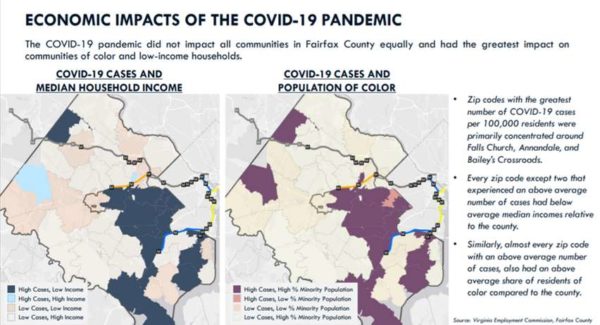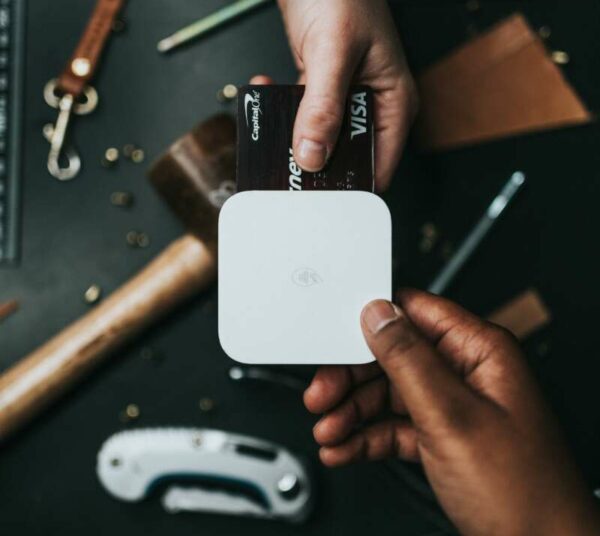
Fairfax County is slated to send additional funding to businesses that suffered the most during the COVID-19 pandemic, but a Black nonprofit says more can be done.
The Northern Virginia Black Chamber of Commerce has repeatedly been neglected in the development of major business grant programs connected to Fairfax County, the nonprofit’s executive director Sheila Dixon says.
“I would have thought we would have had the opportunity to be at the table,” she said.
The county says it’s committed to working with more than 55 chambers, including minority chambers, multicultural groups, and other community and business support groups in multiple languages with its most recent financial assistance initiative.
A working group of local minority business owners is also trying to make changes and build bridges. A webinar co-hosted by the Community Foundation of Northern Virginia on June 23 seeks to address the needs of minority-owned businesses and how they can be helped.
The group has reached some conclusions and recommendations about equitable recovery across the region and is sharing data, according to the event description. Georgetown University adjunct professor Melissa Bradley, who also co-founded a business mentoring service called Ureeka, is the keynote speaker.
The county has noted these kinds of inequities. A consultant report for the county completed in January detailed how low-income and minority households faced greater difficulties in the workforce, along with women, who have been held back by affordable child care challenges.
Those findings came from working with businesses and a roundtable of minority chambers. The Northern Virginia Black Chamber of Commerce was invited to give input and was also asked to participate in a survey about impacts and recovery, according to the county.
Fairfax County’s Relief Initiative to Support Employers (RISE) program, which gave grants to small businesses and nonprofits, dedicated at least 30% of funding to businesses owned by women, minorities, or veterans. Those businesses ended up with 72% of the approximately $53 million of RISE funding, according to the county.
“We are building on and expanding those efforts,” county spokesperson Wendy Lemieux said in an email, adding that the county is committed to extensive outreach with businesses, particularly ones owned by women and people of color affected by the pandemic.
Unlike the RISE program, the county’s new PIVOT grant program didn’t include any provisions explicitly dedicating funds to often marginalized groups when the Board of Supervisors passed it last week.
Meanwhile, the Black chamber of commerce has shared the PIVOT grant information, but it’s also continuing its own initiatives to help businesses recover from the economic effects of COVID-19.
The organization recently launched an outreach called BTRNow (Build Thriving Returns Now) that provided an online workshop for kid entrepreneurs this spring, held a “Caring through COVID” panel discussion on Monday (June 14), and is currently carrying out a listening tour, among other programming.
Dixon says a lot of the chamber’s members have pivoted amid the pandemic and have been thriving.
But she also noted that there can be disparities, and various Black businesses might be reluctant to apply for resources if they’re skeptical that the support will materialize, even if race is considered as a factor in applications.
“It will be interesting to see if people feel more comfortable,” Dixon said. “We are building up and scaling up our businesses and providing them with the education and the resources that are available within the community.”
Photo via Nathan Dumlao/Unsplash
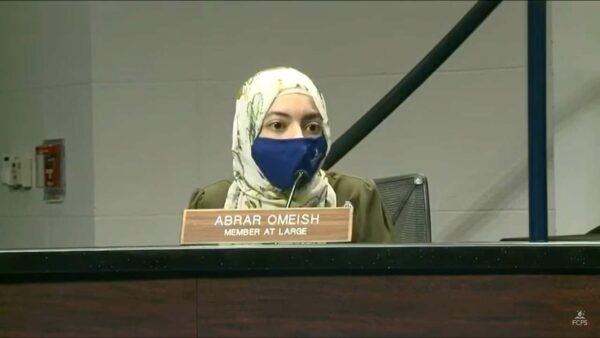
Abrar Omeish doesn’t regret taking a stand on the ongoing conflict between Israel and Palestine, but if she could go back, she might have expressed her opinion a little differently.
The at-large Fairfax County School Board member sparked a heated local debate about one of the most contentious subjects in global politics last month when she recognized Eid al-Fitr, the Muslim holiday that concludes a month of fasting, with a tweet decrying Israel’s treatment of Palestinians as “apartheid and colonization.”
As the board’s only Muslim member and the first Muslim woman elected to a school board anywhere in Virginia, Omeish says she felt a responsibility to speak up about the escalating violence that, at that time, had killed 10 people in Israel, including two children, and 192 people in Gaza, including 58 children.
Her May 13 tweet was part of the larger #EidwithPalestine hashtag that went emerged after Israeli security forces stormed the al-Aqsa mosque in Jerusalem amid tensions over Palestinians being evicted from the city’s Sheikh Jarrah neighborhood.
“The idea was [Muslims] celebrate [Eid], but it’s bittersweet because we can celebrate while mourning and knowing that our Holy Land is being disrespected and people are being killed in their efforts to defend it,” Omeish told Tysons Reporter. “…Being, like you said, the only Muslim voice, I felt tremendous pressure, and it’s not like I didn’t anticipate, you know, backlash.”
That backlash came from expected sources, given the school board’s decidedly Democratic makeup, as the Fairfax County Republican Committee chair called for Omeish’s resignation or removal and endorsed a parent-led campaign to recall her and other school board members that originally stemmed from frustrations with pandemic-related school closures in the fall.
However, the tweet also drew criticism from some colleagues and allies.
Hunter Mill District School Board Representative Melanie Meren said in a tweet on May 14 that she was “aghast” and “appalled,” calling Omeish’s sentiments alienating to members of the community, including herself, and a setback to Fairfax County Public Schools’ equity-related efforts.
“Rebuilding of relationships will need to happen,” Meren said.
The Jewish Community Relations Council of Greater Washington nixed plans to honor Omeish for supporting the recognition of additional religious holidays in the FCPS calendar. Four other school board members were still honored at the advocacy group’s annual membership meeting on May 20.
“The language Ms. Omeish used in this Tweet is deeply offensive and inflammatory to all who support Israel,” JCRC President Ronald Paul and Executive Director Ron Halber said in a joint statement on the decision. “It is irresponsible of her to use her public platform to publicly advance controversial political views that target and marginalize Jewish students and their families and divide our community.”
The letter went on to say that conversations about why JCRC found Omeish’s comment offensive were unproductive as she “continued to stoke the flames of division and acrimony” by not removing the tweet or taking “affirmative steps to try to stem the vitriolic, hateful rhetoric on social media triggered by her remarks.”
For her part, Omeish says JCRC’s statement was “a complete mischaracterization” of how she approached their interactions, saying that she “got yelled at on the phone aggressively” and has “been threatened by JCRC multiple times” about her stance on Israel.
“They told me, like, if you don’t take this down, we will post a statement about you and it’s not going to be pretty,” she said. “They would say things like that to me, and for me, I’m like, look, I respectfully reject the threat. I’m not going to change my position because you’re scaring me.”
Halber and JCRC Associate Director Guila Franklin Siegel disputed Omeish’s characterization of their interactions in a statement to Tysons Reporter:
“We took no pleasure in having to rescind Ms. Omeish’s award. But there is no place for the divisive and offensive language she used in her May 13th Tweet or for her insulting insinuations about the JCRC. We never have and never would threaten anyone. Ms. Omeish stands out among the thousands of elected officials and interfaith leaders from every background who have successfully partnered with the JCRC in nearly a century of community-building. We hope Ms. Omeish undertakes the hard work necessary to understand how her hurtful language impacted members of the Jewish community, including our children in FCPS schools. For the benefit of the entire FCPS community, we hope to be able to work with Ms. Omeish in the future to pursue unity, equity, and mutual respect in Fairfax County.”
Omeish got another opportunity to engage with Jewish leaders, as she promised in a follow-up tweet, at a roundtable convened on May 23. Read More
Woman Pulled Over by State Trooper Calls for Accountability — “Charges against a Black woman pulled over and arrested in Fairfax County, Virginia, have been dropped by the county’s commonwealth attorney and expunged by the courts. But Juanisha Brooks is demanding further action as a result of the March traffic stop…Brooks maintains she was profiled before the stop and treated poorly after it because of her race.” [WTOP]
Fairfax County Parks Inch Back to Normal — “Facilities throughout the Fairfax County park system are returning to nearly normal operations after a series of closures and restrictions due to the COVID-19 pandemic. As we ramp up and reopen, some sites may operate on limited schedules or require preregistration for activities, so we strongly urge park visitors to call sites in advance or check our website to ensure access and availability.” [Fairfax County Park Authority]
Governor Delivers Speech at Final George Mason HS Graduation — Gov. Ralph Northam served as the commencement speaker at George Mason High School’s Class of 2021 graduation ceremony on Wednesday (June 2). It was the first ceremony at the City of Falls Church’s newly built school and the last one before it transitions to the new moniker of Meridian High School. [Falls Church News-Press]
Grant Approved to Replace McLean Field — “The Fairfax County Park Authority Board has approved a $20,000 Mastenbrook Volunteer Matching Fund Grant request from the McLean Youth Soccer (MYS) Association for improvements to Holladay Field in the Dranesville District. Board members voted in favor of the request at their meeting on May 26, 2021.” [Fairfax County Park Authority]
Virginia Holds Vaccine Day of Action — Virginia wants residents to support COVID-19 vaccination efforts by joining a statewide “It’s Our Shot” Day of Action today. Ways to participate include making a plan to get vaccinated, sharing your vaccine story on social media, and becoming a COVID Community Ambassador. [Office of the Governor]
NRA Still Considering Leaving Fairfax — The National Rifle Assocation is still planning to open an office in Texas, though the organization has not determined whether it will entirely relocate its Fairfax headquarters. Last week, a federal judge dismissed the NRA’s bid for bankruptcy protection, taking issue with the group’s secrecy and lack of disclosure. [Washington Business Journal]
Ribbon Cut on Suffragist Memorial — “A memorial honoring the women who fought for their right to vote was dedicated in Fairfax County, Virginia, on Sunday. The Turning Point Suffragist Memorial aims to tell the entire seven-decade story of the suffrage movement…It’s located at Occoquan Regional Park in Lorton on former prison grounds where organizers said the “Night of Terror” took place more than 100 years ago.” [WTOP]
Madison Students Paint Vienna “LOVE” Sign — “Check out the LOVE sign by the W&OD Trail the Madison High School SGA decorated yesterday [May 16]. They worked hard (even in the rain) to display #local #love for each of Madison’s classes represented by a color.” [Town of Vienna/Twitter]
Starting July 1, adults 21 and older in Virginia can legally possess up to one ounce of marijuana.
Ahead of that date, local police departments say they are preparing their officers, while advocates say the bill needs serious retooling to keep kids out of the juvenile justice system and help reverse the harm done to Black and brown communities after decades of unequal enforcement.
“We still have time to fix many of these things,” Chelsea Higgs Wise, executive director of the racial justice and cannabis advocacy group Marijuana Justice, said. “Between now and then, we have elections. We have to talk to people about how they’re going to take this legalization forward while centering equity. This is not over.”
The Virginia General Assembly passed a law earlier this month accelerating the legalization of weed from July 2024 to this coming summer. The law will be reenacted in 2024, when recreational, commercial sales are legalized.
Through June 30, the possession of less than one ounce of cannabis will remain “decriminalized” — that is, it is penalized with a fine, but the incident does not show up on a person’s criminal record.
The new law legalizing cannibis essentially permits those 21 and older to use marijuana inside their homes, and possibly in their backyards; grow up to four plants; and possess up to one ounce of cannabis. The plant must be in a manufacturer’s container for someone to drive with it in the car legally.
Giving cannabis to someone underage is considered a felony, while students younger than 21 who are found in possession of the plant on school grounds would be charged with a misdemeanor. A clause requires court-ordered drug treatment services for individuals 20 and under found with the plant.
People in jail for marijuana-related crimes will remain there, Virginia Mercury reports.
Here are the top areas of interest and concern for police officers, people in the criminal justice system and advocates.
Marijuana-related arrests
Although marijuana-related arrests have been trending down recently, Falls Church City Police Chief Mary Gavin says that one potential consequence of marijuana legalization is more people driving while stoned.
“There are going to be obviously growing pains,” Gavin said. “My biggest concern, in terms of public safety, is the possible increase of driving under the influence.”
According to data provided to Tysons Reporter by the police departments, cannabis arrests appear to be trending down slightly in both Fairfax County and Falls Church City. A chart supplied by Fairfax County Police Department shows arrest rates peaking in 2018 before dropping off dramatically in 2020.
The Falls Church City Police Department reported a similar pattern. It made 61 and 63 arrests in 2018 and 2019, respectively, followed by 17 arrests in 2020 and none so far this year.
Herndon Police Department spokesperson Lisa Herndon said the town had about 125 marijuana-related arrests from Jan. 1, 2018 to Dec. 13, 2020.
Gavin attributed the recent drop-off in arrests to a combination of the COVID-19 pandemic and a policy change introduced by Fairfax County Commonwealth’s Attorney Steve Descano, who ceased prosecuting simple marijuana possession cases against adults when he took office on Jan. 2, 2020.
Descano told Tysons Reporter that he stopped prosecuting marijuana cases because it would be the right approach for community safety and racial equity. His office estimates that more than 1,000 cases have since been dismissed.
“While the opposition to this decision was intense at the time — so much so that we planned to create a bail fund in case our attorneys were held in contempt of court and jailed — I am pleased that other jurisdictions followed suit and marijuana has now been legalized across the Commonwealth,” Descano said. Read More
In a divisive decision, the Fairfax County School Board voted late last week to recognize some religious holidays in the next school year, but fell short of giving students a day off on those days.
Next year’s academic year will not give students a day off on 15 religious observances, including Rosh Hashanah, Yom Kippur, Eid, and Diwali. In what proponents described as a middle-ground option, the holidays would be recognized as special days during which tests, quizzes, field trips, and other events would not be scheduled.
Overall, students would receive an allowance of 16 hours to make up for any religious or cultural reasons.
The following religious and cultural observance will be observed; Eid al-Adha, Rosh Hashanah, Yom Kippur, Día de los Muertos, Diwali, Bodhi Day, Three Kings Day/Epiphany, Orthodox Christmas, Orthodox Epiphany, Lunar New Year, Ramadan, Good Friday, Theravada, Orthodox Good Friday/Last Night of Passover and Eid al-Fitr. The days were selected based on absentee rates over the last five years.
Employees will also be given up to 16 hours of any time missed for religious and cultural observances.
School board chair Ricardy Anderson touted the move as one that favors “equity and inclusivity.”
“It aims to center equity by elevating our systems’ respect for religious and cultural observances,” Anderson wrote in a statement. “While this final calendar for 2021-22 may not align with the goals of everyone in Fairfax County, it recognizes all religious and cultural observances where Fairfax County Public Schools (FCPS) has seen above-average absences over the last five years.”
In a letter to the FCPS community, Superintendent Scott Brabrand recognized that the discussion surrounding this issue was divisive and riled by faith organizations and parents.
“We acknowledge that while this has been a challenging discussion, FCPS is committed to equity for all of its students and staff,” Brabrand said. “Moving forward, FCPS will establish a calendar development process that allows the School Board to identify clear criteria and priorities for the calendar; defines the roles of staff, Board, and community members; and creates a robust community engagement process that outlines how and where feedback will be solicited and shared with the Board.”
But the decision drew concern from many local and area religious groups. In a joint statement, the Ahmadiyya Muslim Community, Association of United Hindu and Jain Temples of Metropolitan Washington, Durga Temple of Virginia, Hindu American Foundation, Jewish Community Relations Council of Greater Washington, McLean Islamic Center, Northern Virginia Hebrew Congregation, and Temple Rodef Shalom wrote that the school board’s attempt to divide religious groups backfired.
“While the school board has sought to divide us further, we have coalesced around this issue, strengthening our commitment to one another and to the equity of religious minority groups in Fairfax County,” the statement reads. “We will continue to hold the FCPS School Board and Administration accountable to ensure that our communities are not disadvantaged by the decisions taken today.”
The new rules will go into effect when the school year begins on July 1. The board also voted to decouple Good Friday from Spring Break.
Photo via FCPS
Inundated with messages from staff and community members on proposed changes to the 2021-22 calendar, Fairfax County School Board members directed Superintendent Scott Brabrand to redraft it.
During a work session on Tuesday (Mar. 2), the board told staff to consider ways to add flexibility through floating holidays. They said the calendar should take into account legal considerations, instruction, student wellness and pay for support staff, as well as survey preferences, absenteeism data, transparency and equity.
The school board will vote on a final calendar on Mar. 18.
FCPS announced last June that the school board will consider two ways to add in four religious holidays: Rosh Hashanah (Sept. 7, 2021), Yom Kippur (Sept. 16, 2021), Diwali (Nov. 4, 2021), and Eid al Fitr (May 3, 2022).
FCPS drafted a third proposal without those holidays in February, as some board members expressed reservations about the potential disruptions they would create.
“Support staff have been very vocal in terms of what the impact on their work will be,” School Board Chair Ricardy Anderson, who represents the Mason District, said on Tuesday. “I’m very mindful of what this means for our families who rely on schools for breakfast and lunch. We also know that we’re coming out of the pandemic, and we have had a lot of impact in terms of continuity of learning.”
Anderson reported receiving 269 messages from support staff, estimating at least 100 more. Member-at-large Karen Keys-Gamarra also said she received more than 700 written responses on the calendar.
Meanwhile, 286 students have signed a petition, and 76 clergy and faith organizations have signed a letter initiated by the Jewish Community Relations Council of Greater Washington (JCRC) urging the board to add the holidays.
Responding to the news that FCPS would be developing a new calendar, the Pozez Jewish Community Center of Northern Virginia said in a statement that it was heartened to see the board reject the calendar that did not include the new holidays.
“We are optimistic that the next option proposed will be one that is forward-thinking — acknowledging and respecting the cultural and religious diversity of the staff and students of faith in the county, as well as the community at large,” Pozez JCC Executive Director Jeff Dannick and President Susan Kristol said.
Member organizations of a Religious Observances Task Force, which FCPS formed to advise the school system on supporting religious minorities, had “strenuously” objected to the third calendar draft, saying its proposal lacked transparency.
“Given where the community has been at, where the process is so far, what data has revealed, it goes without saying that we need to give this a deliberate look,” member-at-large Abrar Omeish said. Read More
Hispanic residents of Fairfax County are seven times more likely to die from COVID-19 than their white, non-Hispanic counterparts when adjusted for variations in age, county data suggests.
Fairfax County Director of Epidemiology and Population Health Dr. Benjamin Schwartz reported that sobering trend to the Fairfax County Board of Supervisors during its health and human services committee meeting yesterday (Tuesday) as part of a broad overview of the county’s efforts to implement an equity-focused strategy to distribute COVID-19 vaccines.
Knowing that the pandemic has disproportionately affected communities of color, especially Black, indigenous, and Latino people, Fairfax County staff calculated the relative risk levels for infection, hospitalization, and death faced by different races and ethnicities, using white, non-Hispanic individuals as the control group.
According to the county, the results show that the risk of contracting COVID-19 is 1.8 times greater for Black people than for white people and four times greater for Latino or Hispanic people, who are also seven times more at risk of hospitalization.
In Fairfax County, Black people are being hospitalized at more than three times the rate of white people and are almost three times as likely to die from the disease.
Schwartz says the data focuses on community transmission, excluding long-term care facilities, and it has been adjusted for age, meaning it eliminates variances in age across different populations. It shows, for instance, that Latinos are more likely to die from or be hospitalized by COVID-19, even though the county’s Latino population is generally younger and older people are considered more at risk.
“This really highlights the social, economic, and medical risk factors pertaining to different groups in our county,” Schwartz said, mentioning large households, exposures through work, and underlying health conditions among the factors that have made some populations more vulnerable to COVID-19.
Fairfax County Chief Equity Officer Karla Bruce says the county is utilizing its COVID-19 Vulnerability Index as well as data showing the disease’s spread to identify areas that need a targeted approach for vaccine outreach and distribution, often because residents have limited access to medical care, transportation, and other public services.
“There are a lot of intersecting factors which are preventing people’s access to resources or access to the vaccine,” Bruce said. “So, we want to understand and look at how we might be better able to connect people to what will enable them to then connect to the vaccine.”
The county has been working with different community partners, including nonprofits and faith-based organizations, not only to counter vaccine hesitancy with education and trust-building, but also to identify people who are currently eligible to get vaccinated and register them for an appointment.
To improve the accessibility of the vaccine, the Fairfax County Health Department has been developing a network of community-based partner clinics that is expected to grow in the coming weeks, as seen in the slide below:
Schwartz says the Neighborhood Health federally qualified health center at the Bailey’s Community Center and the Safeway community clinic at the James Lee Community Center in Falls Church will start administering vaccinations this coming weekend.
The health department is also looking at sites in Lorton, Springfield, and Centreville, but the agreements are still being finalized.
“It will take a couple of weeks to have our clinics established, to confirm medical and non-medical staff for those clinics, and to get into a rhythm with the vaccinations,” Schwartz said. “But we are anticipating making substantial progress to reduce disparities in who receives vaccination in the county.”
Photo via Fairfax County, slides via Fairfax County Health Department (1, 2)
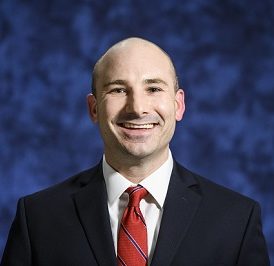 Measures to curb public safety concerns and improve how the criminal justice system can serve the community are being implemented in Fairfax County.
Measures to curb public safety concerns and improve how the criminal justice system can serve the community are being implemented in Fairfax County.
That was the message Fairfax Commonwealth’s Attorney Steve Descano shared during a public forum with the McLean Citizens Association on Wednesday (Dec. 16).
Before responding to audience questions, Descano highlighted three top agenda items: the implementation of body-worn cameras by police, providing appropriate resources for the Commonwealth’s Attorney’s office, and general criminal justice reform.
Descano said the Fairfax County Police Department’s body-worn camera program should be mostly in effect by the end of 2021, estimating that the program will include roughly 1,200 cameras.
“I really do feel that body-worn cameras are essential to creating trust in the community,” Descano said. “They are a great tool for evidence. They are a great tool for police accountability. Quite frankly, they’re also, in many ways, a tool to make sure that our police aren’t being accused of things they did not do. So, it really is a win-win-win all the way around.”
He pointed to the indictment of Fairfax County police officer Tyler Timberlake on three misdemeanor counts of assault and battery in July and other high-profile cases as examples of the difference that body cameras could make in holding police accountable.
According to Descano, footage from the cameras will be stored and transmitted in an integrated system from a server run by the company Axon Enterprise. The footage must be kept according to timeframes established by the Virginia Public Records Act.
He also said the footage is meant to be available to exonerate or prosecute people accused of alleged crimes, protecting innocent people and detecting evidence of crimes to ensure the criminal justice system produces the “right outcome.”
Descano also noted that one “flip side” of the program is that it will add to prosecutors’ workload, since they have an “ethical obligation” to review all evidence in cases they prosecute. He estimated that body-worn cameras will add roughly 89,000 hours of video footage to the approximately 60,000 hours of footage from cruiser dash cameras that must also be reviewed. Read More
Like everywhere else in the U.S., the COVID-19 pandemic and ensuing economic fallout have hit Fairfax County hardest in its most disadvantaged communities, consultants confirmed in a presentation to the Fairfax County Board of Supervisors on Tuesday (Nov. 10).
With the exception of just two zip codes, the areas in Fairfax County with more COVID-19 cases also have more residents of color and lower average median incomes than the county as a whole, according to HR&A project manager Olivia Moss.
The zip codes with the most COVID-19 cases per 100,000 residents are concentrated primarily around Falls Church, Annandale, and Bailey’s Crossroads.
On top of that, low-income residents and people of color have been most affected by the national economic downturn that started this spring, when businesses and public spaces temporarily closed in an effort to control the spread of the novel coronavirus.
90% of all job losses in Fairfax County this year have occurred in industries like retail and food services, where average wages are less than 80% of the county’s area median income. 63% of the county’s job losses were in industries where the majority of workers are people of color.
“We know across the country, the pandemic and the resulting economic crisis has not been distributed equally across everyone and every business sector,” HR&A partner Jeff Hebert said. “So, really trying to understand what’s happening in Fairfax and how you can be part of creating a more just recovery in Fairfax is going to be really important to the community that will result after this pandemic is over.”
Fairfax County hired HR&A this summer to develop an economic recovery framework to guide the county’s response to the economic challenges presented by COVID-19.
To create a “new normal” that addresses the socioeconomic inequities exposed and deepened by the ongoing pandemic, Fairfax County needs recovery strategies targeted to different industries and populations based on their specific needs, Hebert and Moss say.
For instance, the county could assist the hardest-hit industries – led by the hospitality and food services sectors, which have shed 12,420 jobs or 26% of their entire workforce – by helping them reduce costs, evaluating regulatory requirements, and supporting programs to rebuild consumer confidence.
Initiatives like the RISE COVID-19 Small Business and Nonprofit Relief Grant Fund that the Board of Supervisors approved in May will be critical too. Through RISE, Fairfax County has awarded $52.5 million to 4,804 businesses so far, 72% of them owned by women, minorities, or veterans.
Lee District Supervisor Rodney Lusk says Fairfax County should adapt its recovery strategies to specific geographic areas as well as industries, noting that the pandemic’s economic impact in his district has been especially acute in the Richmond Highway corridor.
“Certain parts of Fairfax County are going to have different needs and issues,” Lusk said. “Tysons, Reston, Herndon are in a very different position than Bailey’s, Richmond Highway, and parts further south.”
Workforce development will also be essential to help people whose jobs may never return.
While 40,300 of the approximately 48,200 jobs lost during the pandemic are projected to be recovered by the end of the year, Fairfax County’s labor force has contracted by about 22,000 workers. Women in particular have been driven out by issues like inadequate or uncertain access to childcare, Hebert says.
“The reskilling piece is probably the important thing in here, from my standpoint. Not only if you’re going to help those most vulnerable in the community, you’re going to do that by making sure they have a skill set to take advantage of our future economy,” Board Chairman Jeff McKay said, suggesting the green economy as one industry with a lot of potential for growth.
HR&A will continue analyzing the impact of COVID-19 on Fairfax County before delivering a report with recommendations for recovery strategies and programs in January 2021.
Staff Photo by Jay Westcott


